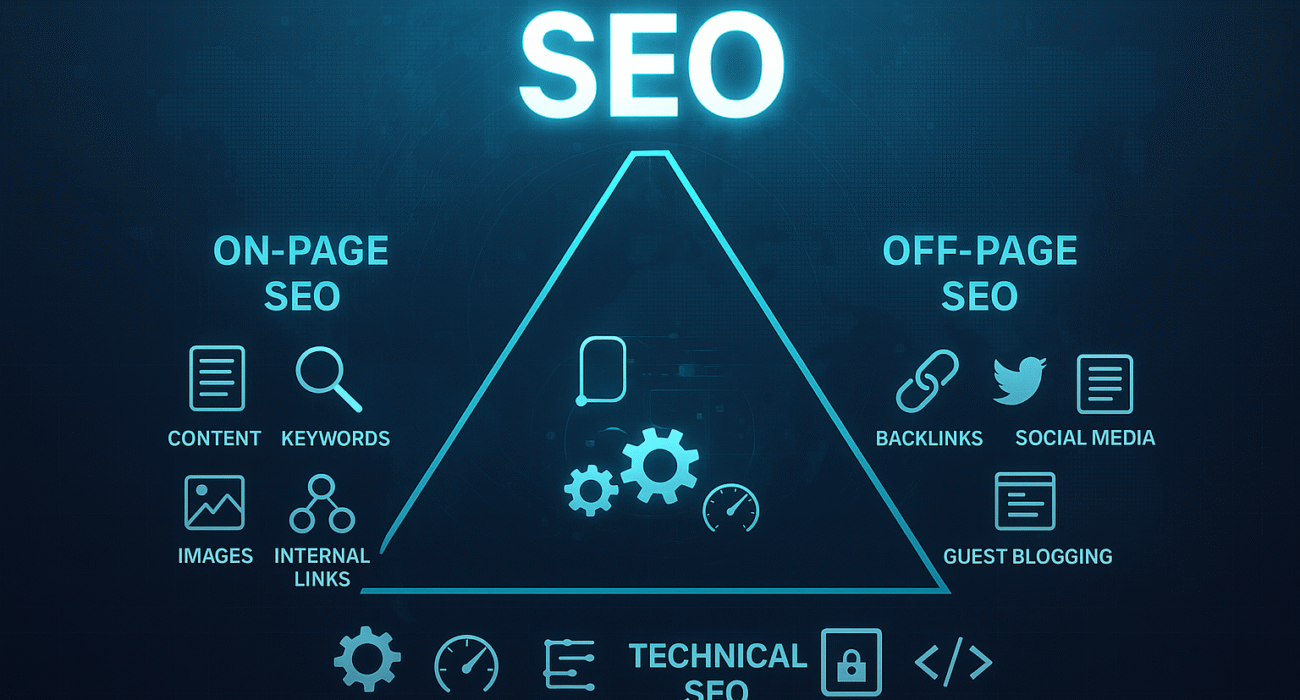In the constantly evolving digital landscape, one term remains foundational for online success: SEO. Search Engine Optimization is not a ”one size fits all all” strategy. SEO is a multi-faceted discipline made up of three critical components
- On page SEO
- Off page SEO
- Technical SEO
Understanding and leveraging each type is essential for a comprehensive digital presence that ranks high on Google and other search engines.
In this blog, we’ll explore what each SEO type entails, how they differ, and most importantly, why they all matter.
What is On-Page SEO?
On page SEO refers to the optimization of individual web pages to improve their search engine rankings and attract more relevant traffic. This involves everything you can control on your own website.
Key Elements of On-Page SEO:
- Keyword Optimization: Including target keywords in the title tag, meta description, headers (H1, H2), and throughout the content.
- Content Quality: Creating informative, relevant, and engaging content that provides value to the reader.
- Internal Linking: Connecting relevant pages on your website to guide users and help search engines crawl your site better.
- Image Optimization: Using proper file names, alt tags, and compressed images to improve page speed and accessibility.
- Mobile Friendliness: Ensuring your website is responsive and looks good on all devices.
- URL Structure: Clean, readable URLs that include target keywords.
Why On Page SEO Matters:
This type of SEO is your first line of defense. It ensures that your content is discoverable, readable, and understandable both to users and search engines. Without solid on page SEO, your other efforts won’t gain the traction they need.
What is Off Page SEO?
Off page SEO involves activities conducted outside the boundaries of your website to improve its authority and search rankings. Think of it as building your website’s reputation across the internet.
Key Elements of Off Page SEO:
- Backlink Building: Acquiring high-quality links from other websites, especially those with strong domain authority.
- Social Media Marketing: Driving traffic and engagement through platforms like LinkedIn, Twitter, Facebook, and Instagram.
- Guest Blogging: Writing articles for external websites to gain backlinks and exposure.
- Online Reviews and Mentions: Encouraging satisfied customers to leave reviews on platforms like Google, Yelp, or industry specific directories.
- Influencer Outreach: Collaborating with influencers and industry leaders to amplify your brand’s reach.
Why Off-Page SEO Matters:
Search engines view backlinks and brand mentions as votes of confidence. The more high quality backlinks your site has, the more trustworthy it appears. Off page SEO is crucial for improving your site’s domain authority, which directly impacts your search engine rankings.
What is Technical SEO?
Technical SEO refers to optimizing the infrastructure of your website so search engines can crawl and index it effectively. Unlike on-page or off page SEO, it doesn’t focus on content or promotion but on website architecture and performance.
Key Elements of Technical SEO:
- Site Speed Optimization: Ensuring fast loading times through image compression, browser caching, and code minification.
- XML Sitemaps: Creating and submitting sitemaps to help search engines understand your website’s structure.
- Robots.txt File: Guiding search engine bots on which parts of your site to crawl.
- HTTPS Security: Securing your site with an SSL certificate.
- Canonical Tags: Preventing duplicate content issues by specifying the preferred version of a webpage.
- Structured Data Markup: Adding schema markup to help search engines understand the content better and enable rich snippets.
Why Technical SEO Matters:
If your site is not technically sound, no amount of great content or backlinks will help. Technical SEO lays the groundwork for all your SEO efforts to be successful. It’s what enables Google’s bots to efficiently index your pages, understand your content, and rank it appropriately.
Why You Need All Three Types of SEO
Think of SEO like a tripod. If one leg is missing, the structure becomes unstable. Similarly, neglecting one aspect of SEO can compromise the performance of the other two.
- On page SEO brings traffic by aligning content with user intent.
- Off page SEO builds your site’s authority and credibility.
- Technical SEO ensures your site performs efficiently and is accessible to both users and search engines.
Each SEO type supports and enhances the other. A fast, secure website (Technical SEO) with great content (On-page SEO) that others link to (Off-page SEO) creates a powerful synergy that drives visibility and results.
Final Thoughts: Holistic SEO Strategy for 2025 and Beyond
In today’s competitive digital ecosystem, isolated efforts simply won’t cut it. Businesses that thrive online invest in a comprehensive SEO strategy that covers all three pillars. Whether you’re running a blog, e-commerce platform, or corporate website, success in search rankings demands a unified, well rounded SEO approach.
If you’re unsure where to start or which area needs attention, it might be time to audit your site for all three types of SEO. Remember, SEO is not a one time task, it’s a continuous process of improvement.
Let your content speak, your authority build, and your technical foundation support your goals.
Because in the world of digital marketing, SEO isn’t just an option , it’s a necessity.
Simply click the WhatsApp icon in the right hand corner of the page to reach us for a free site audit.

